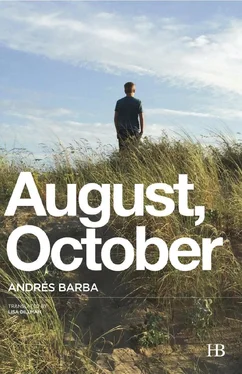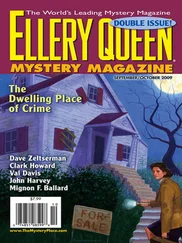He headed for the estuary, because the estuary was where you weren’t supposed to go. The area beyond the houses and the three apartment blocks was forbidden territory. When coming in from the highway, you went through that part of town. The houses were flat and square, like cardboard boxes stacked up by a dumpster (“They should just get rid of all those people.”—Mamá); he had a few memories, some fixed, others fluid, as though something in them had turned liquid as they passed by — three men standing by a door talking, a bunch of kids, beat-up old pick-up trucks — there was something sad and violent about it, albeit without any visible signs of violence (“And where would you suggest putting them? It’s not like they’re hurting anyone.”—Papá), and people said that was where all the drug trafficking went on, but drugs, too, were a far-off place, an event difficult to imagine, something vertical atop the squashed-down horizontality of those houses, as if drugs rained down from the sky like brimstone.
The morning heat became palpable as he continued walking in that direction, and when he crossed the vacant lot separating the last few buildings from those houses, he recalled that the previous summer, Aunt Eli mentioned that a man had turned up dead there. By the lot was a pine grove not very different from the one separating their house from the beach; there, however, the stumpy pines on the marshland looked more gnarled, squatter, as though stunted by some nefarious earth-force. He didn’t know what he was hoping to find; he was trying to translate it into words, but he’d always been better at feeling than thinking. He even said it aloud—“A dead man.” But nothing happened.
When he was just two hundred yards or so from the houses, he saw them in the distance, heading toward town, toward him. It had occurred to him that he’d end up bumping into them at some point. From the distance they looked older than they in fact turned out to be. There were four of them, two were shirtless and all four wore long swim trunks. The last rational thought he had was that if he turned around right then and started running for the buildings, they wouldn’t be able to catch him, but rather than do that, he bent and picked up a rock the size of his hand and kept going. When he was twenty or so yards away, he saw them talking amongst themselves, and when he was just five yards away, they stood blocking his path. He didn’t examine their faces closely, and in fact they all looked to him like a single, dark, almost black mass; individually, none of them was stronger than he was, and although they were his age, they seemed slightly older because they were tough.
“Where you off to, princess?”
“Just taking a walk.”
“All by your lonesome?”
He didn’t know how it seemed to other people, but to him violence was something akin to a weather condition inside your skull, a certain quality to the air, something dry and crackly and electric. Sometimes he seemed to go looking for it without meaning to, other times it seemed to hound him, closing in and wreaking havoc on his senses, the single most unfailing instinct, the most instinctual of all instincts. In a flash, muscles tensed, a decision was made, and it was too late to stop anything. There was something almost sensual about it, not so much the actual event (he’d only been in three fights in his life, and all three had been over in a flash) but the build-up; violence, really, was a drawn-out endeavor, fights were won or lost long before they took place, in the dance of glances, tension, hesitation. When he looked again at their faces, they seemed more aggressive than before. He felt unsure of his chances, but also excited by the fact that they hadn’t already pummeled him.
“I’ve got a rock here. The first one to come at me gets his nose broken. You’ll probably kill me after that, but over my dead body, one of you is going home with a broken nose.”
“Break his —wouldn’t be the first time.”
“Why don’t you let him break yours, you fucking asshole?” the other kid replied.
They were silent for an instant. If the situation wasn’t resolved immediately, he thought, he didn’t stand a chance. They were still unruffled, but he was increasingly nervous. Then suddenly he became afraid. He felt like one of his legs was trembling and pressed it harder into the ground so they wouldn’t be able to tell. It was true, one of them did have a smashed-looking nose. The stockiest one crouched down and picked up a rock, too, almost as big as his.
“Look, princess — now I got a rock, too. What if I break yours instead?”
“Hey,” another kid said, “I like your Tshirt. Can I have it?”
“No.”
“Selfish,” he retorted, mockingly. “No need to be so selfish. .”
He felt them edge closer. His mind was nearly blank. His hands were shaking, and he felt his face turn pale, and then red, and then even redder. In a way he was proud of himself, but he was also so scared that he worried he’d be unable to control his own reactions from one second to the next. He knew he had to strike first; it didn’t matter what happened after that, he had to strike first. He took a step forward, but then suddenly hesitated and the biggest kid shoved him hard, causing him to fall onto his back. He leapt up and grabbed the legs of the first boy he could, pulling him to the ground. He heard one of them speak.
“Wait, let’s see what he does.”
And in a flash he grabbed the neck of the kid he’d pulled down. He immediately realized he was the stronger of the two but was afraid they’d all dive in. Grabbing him in a chokehold, he saw his face, which looked haloed in white; he was panting. The kid was weirdly ugly, with a strange upper lip, like a harelip. Little by little, vacillating, he loosened his grip and then stood. He was sweating profusely. He stood there as if to say who’s next ? It was clear he didn’t have a chance against the stocky one.
“Not bad,” said the kid who looked the oldest, smiling sort of scornfully. And then, after a brief silence, “Hey.”
“What?”
“Come with us.”
“Where to?”
“The dock, to go swimming.”
There came another moment of indecision, of incredulity, and then he rattle-laughed, as though hit by machine-gun fire. He saw them smile — all but the kid he’d knocked down, who was still massaging his neck and pissed off. Violence was a psychological game, too, a motor. The piston generated a spark and after the explosion, it released hot, heavy air.
“OK, I don’t have anything else to do,” he replied.
So, those were the kids from the dock. He’d already seen them several times over the course of that first week and longed to join them but at the last minute had always been overcome by shyness. Sometimes he lacked the final push it took to make up his mind to actually do things, as though his brain worked faster than his desires and handed him everything already carefully and thoroughly digested; he could live with tension and fervor, and handle situations that demanded speed and skill, but not those that required strategy — that was when he became nervous and impatient.
“What are your names?”
“Pablo.”
“Tejas.”
“Rivero.”
And when the fourth boy did not answer, the last to speak added, “That’s Marcos.”
Their voices had a different tenor somehow — intimate, like wood grain. Seen from up close, they now took on their own individual characteristics, but they all still had something in common, too, as though their beauty emanated from their discontent, from their anger. Marcos was blond, skin and bones, and his lip gave him the surly air of an ex-convict; he had a jerky, flailing bounce to his step, as though through sheer agitation something inside him had gotten tangled up. Pablo and Tejas, sinewy as two nerves, looked so much alike that he thought they were brothers that first day. They were the happiest and most sarcastic of the group, and also the calmest. Rivero was the brawniest and the only objectively attractive one of the four — like a new and improved model. They couldn’t have been more than fourteen, and yet they were older than him, as old as fossil fish, as survival, as torture or neglect. They’d become realists. Their sexuality was clearly developed, and that seemed to have created mysterious bonds among them, a closeness and empathy, like wolves that went hunting in a pack.
Читать дальше












